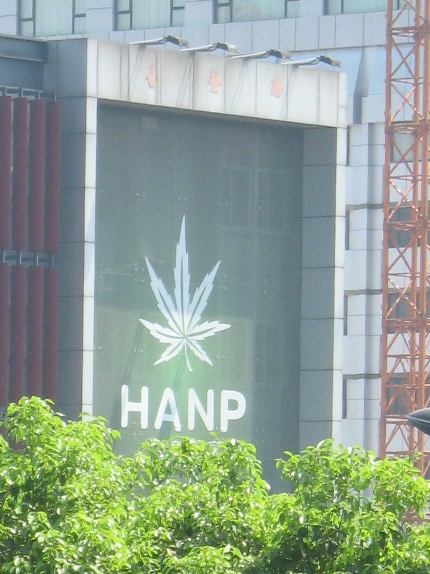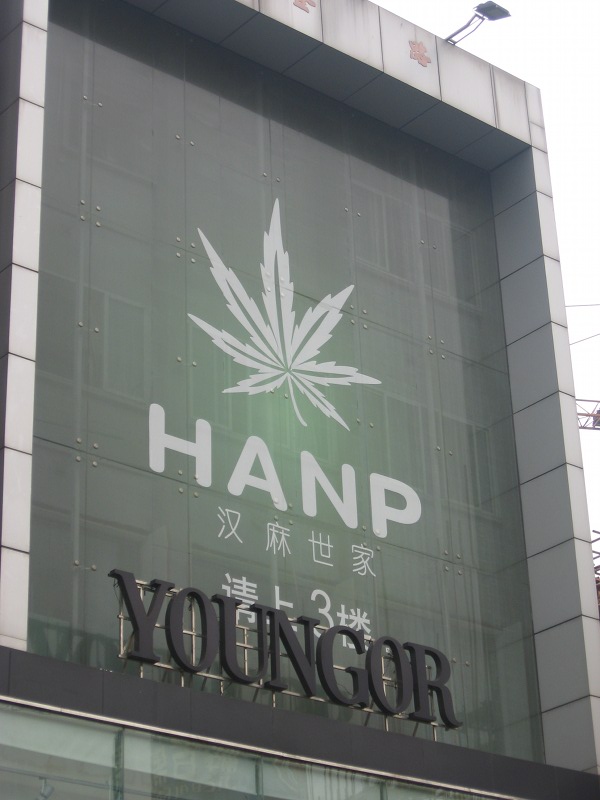HANP
« previous post | next post »
 Several weeks ago, Ian Mair sent me this enigmatic photograph from Hangzhou.
Several weeks ago, Ian Mair sent me this enigmatic photograph from Hangzhou.
The sign intrigued me as much as it did Ian. I could see what looked like a marijuana leaf and the name HANP, so I assumed that it was a Chinglishy misspelling of "hemp." But tree foliage covered up the bottom of the sign, so I didn't feel confident about trying to figure out if this was an ad for Mary Jane (highly unlikely in the PRC) or something else entirely (e.g., was HANP an acronym?).
Curious to get to the bottom of the sign, Ian took the time to go back to that part of the city and take another photograph from up close and looking up from below.
This made things a lot clearer. Just beneath the word HANP, we read Hàn má shìjiā 汉麻世家 ("Chinese hemp aristocratic / influential family"). This is a brand of the Youngor group, one of China's best-known manufacturers of men's wear. HANP specializes in clothing and other textile products made of hemp. Like HANP, Youngor (the name of the parent company) looks as though it were trying to be an English word, but didn't quite make it.
The other part of the sign just says "Please come up to the 3rd floor."

Twitter Trackbacks for Language Log » HANP [upenn.edu] on Topsy.com said,
September 21, 2010 @ 6:59 am
[…] Language Log » HANP languagelog.ldc.upenn.edu/nll/?p=2644 – view page – cached Several weeks ago, Ian Mair sent me this enigmatic photograph from Hangzhou. Tweets about this link […]
Anna said,
September 21, 2010 @ 7:22 am
Actually I think it's quite a smart translation. 汉麻, that's Han Hemp => Hanp.
Leonardo Boiko said,
September 21, 2010 @ 9:05 am
> looks as though it were trying to be an English word, but didn't quite make it.
I just wanted to congratulate you for this image :)
Estel said,
September 21, 2010 @ 10:05 am
Interestingly, the word 'hemp' used to have an n, until it collided with the p and got assimilated to it; in Old English, the word was henep or hænep, according to the OED.
DL said,
September 21, 2010 @ 10:35 am
Last tidbit. In Chinese, there are no phonics that end in 'm.' So "hamburger" becomes "HANbaobao," etc. (Someone more knowledgeable than I would probably say something about 'm' being a bilabial and 'n' being a linguolabial consonant.) Chinese people, in fact, may have difficulty with bilabial finals? If they do, "HANP" would make sense as a Chinglish version.
I.D. Mercer said,
September 21, 2010 @ 11:06 am
Interestingly, the French word is spelled with "an" in the middle:
http://fr.wikipedia.org/wiki/Chanvre
JL said,
September 21, 2010 @ 12:11 pm
So is the German Hanf (see Estel's comment), which I thought of at first.
sister_ray said,
September 21, 2010 @ 12:30 pm
To me it looks as if someone was writing the German word for hemp which is Hanf in pseudo-cyrillic script. Or they meant to write HANF and just messed up on the last letter.
Geraint Jennings said,
September 21, 2010 @ 1:40 pm
Canvas, anyone? And related, in Jersey we have a school (http://vle.jeron.je/GroupHomepage.asp?GroupID=552) named after the hemp fields which were cultivated in the area time past. Always amuses the students.
Dan T. said,
September 21, 2010 @ 4:16 pm
Was Hempstead, Long Island, New York of a similar origin?
Barbara Phillips Long said,
September 21, 2010 @ 9:57 pm
Apparently not:
"Hempstead was settled in 1643 by a band of Puritans who sailed across the Long Island Sound from Stamford, Connecticut in search of a place where they could more freely express their particular brand of Protestantism. They were led by the Rev. Robert Fordham and John Carman, both disciples of the Rev. Richard Denton, the leader of their sect. They landed on Long Island at what is now called Roslyn village and trekked southward across a great prairie where they stopped between two fresh water streams and several small ponds. They bargained for the land with the leaders of the local native tribes and made an agreement that allowed them to establish a "town spot" at what is now the Village of Hempstead as well as establishing property rights to what are now known as the Towns of Hempstead and North Hempstead. …The name Hempstead is thought to have derived from a town in Hertfortshire, England known as Hemel-Hempstead, perhaps the birthplace of the Rev. Richard Denton. A number of the original settlers came from that area."
From http://longislandgenealogy.com/hempstead.html
Ben said,
September 22, 2010 @ 2:10 am
@DL "In Chinese, there are no phonics that end in 'm.' "
By "Chinese" you probably meant Mandarin specifically. I am only familiar with Cantonese and Toishanese (台山話), but both of those have syllable finals ending in m.
Martin said,
September 22, 2010 @ 11:16 am
@DL "'n' being a linguolabial consonant"
Only if pronounced by Britney Spears.
ajay said,
September 27, 2010 @ 7:00 am
Last tidbit. In Chinese, there are no phonics that end in 'm.'
Depends on the dialect, I should think. There are lots of Cantonese surnames that end in M – Tam/Tham, Kam, Sam, Lam.
Helen Liu said,
September 28, 2010 @ 9:39 am
Many words in the Taiwanese (or xiamen hua) also end in m, such as LAM (to pour water on something), MM (no, not, don't–usually precedes another word), DAM (wet), GAM (sweet), another GAM (this one I don't know how to explain!).